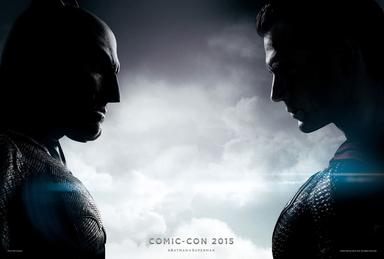
San Diego Comic-Con ended last week, and it did not disappoint. There were previews of the movies and TV shows being added to pop culture in the coming months, including a behind-the-scenes featurette of Star Wars Episode VII: The Force Awakens, and a number of longer-than-usual trailers for DC and Marvel superhero properties such as X-Men: Apocalypse, Deadpool, and, most importantly, Batman v Superman: Dawn of Justice. You wouldn’t usually associate the Caped Crusader or the Man of Steel with prohibitions in Judaism, but I’ve got a theory that links their upcoming movie to the Ten Commandments. First, we need some exposition.
Christopher Nolan’s Dark Knight trilogy ended three years ago with Christian Bale’s Bruce Wayne hanging up his cowl and retiring from vigilantism, making room for a Batman reboot. In 2013, Superman got a reboot with the lackluster Nolan-produced, Zack Snyder-directed Man of Steel, serving as the start of a comic book cinematic universe similar to Marvel’s MCU. The Superman sequel, coming next year, will pit the Kryptonian against Gotham’s non-super superhero.
Many feel like Warner Brothers is trying to rush its DC cinematic universe too soon by cramming a good chunk of the Justice League into one movie, and rebooting Batman so quickly is like having a new Spider-Man movie only five years after the Sam Raimi trilogy ended. But let’s not get caught up on production minutiae — I want to focus on the movie’s plot.
After the events of Man of Steel, the world is still grappling with the existence of alien life and the destruction of Metropolis caused by the tussle between Clark Kent and General Zod. Some people worship Superman as some kind of deity, while others scribble “false god” on a statue of him. It’s a mature premise that aims to take a rational view on how humanity would react to and deal with the revelation of a superhuman entity on this earth — think Doctor Manhattan in Watchmen. Fearing the power that Superman has at his control, Bruce Wayne sets out to stop what he sees as a super threat to the earth’s existence.
That’s why I posit that the film is an analogy for the first and second of the Ten Commandments: “Thou shalt have no other gods before me” and “Thou shalt not make unto thee any graven image.” There’s precedent for this. Both characters were created by Jews — Batman by Bob Kane and Bill Finger, Superman by Jerry Siegel and Joe Shuster — and many people have written about the similarities between Superman and Moses. This time around, that’s not the case. Judging from the trailer and all the promotional material that’s been released, I see Bruce Wayne playing the role of Moses, Superman serving as the golden calf, and all of humanity in the role of the Israelites.
Think about it: For years, Batman works in the shadows, trying to show people the light, fighting for justice and all that is good. He’s trying to lead people to a better way of living, like Moses as the Israelites went from the murderous and idolatrous land of Egypt to the promised land of Canaan. However, when Moses goes up on Mount Sinai to receive the law, the Israelites sin by creating and worshipping a calf of pure gold. This egregious sin causes the first two tablets to be broken and Moses must plead the Israelites’ case to God, who wants to kill the whole lot of them.
In the movie, like the biblical story, humanity begins to worship something it doesn’t understand just because it sees it as powerful. Rather than take the onus onto themselves and make the world a better place, humans would rather turn to a false god they believe will solve all their worldly problems, because they’re scared and yearn for something to believe in. Realizing how destructive this being is, Wayne takes it upon himself to defeat this false god and expose him for the menace he believes he is and show humanity the error of its ways. (Of course, I’m sure they’ll end up being close friends and allies before the movie is over.)
All in all, it seems like a warning against believing in false gods instead of thinking for yourself. While Judaism believes in one God, it has many rules and prohibitions that require you to live ethically. Judaism is not about belonging to a hive mind and bowing to an object you believe will provide all you need. It’s about being kind and moral to those around you. Batman seems to be an embodiment of this, an almost Moses-like figure who wants to smash idols and reveal what he knows to be the truth.
Now that’s a sermon I’d like to hear from the rabbi on Shabbos.
Josh Weiss is a student at Drexel University.
